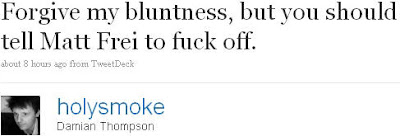Further to Robin’s post yesterday about this week’s Newswatch, here are the transcripts of the exchanges between presenter Raymond Snoddy and environment correspondent Richard Black.
First exchange:
Snoddy: Richard Black, as a journalist do you think the BBC really underplayed this story despite Today and Newsnight items?
Black: In quantitative terms I’m not sure that we have underplayed it. I don’t think that stands up. But there is another side to – certainly comments I’ve had in from the public – is that, which talk about the way we’ve treated it and whether we’ve asked the kinds of questions that Chris and Anthony [the guest viewers in the studio] are suggesting that need to be asked.
Snoddy: In science terms the Newsnight science correspondent said this was as bad as it gets in science. I mean, has the BBC really reflected the enormity of this controversy?
Black: Well there are different views about how enormous it really is. There are many in the scientific community who say that it actually doesn’t alter the scientific picture one jot. To start with the Climatic Research Unit at the University of East Anglia is just one of a number of institutions in the world that keep records of global temperatures so even if all the CRU interpretations and analysis turned out to be wrong it doesn’t invalidate all the other analyses. And they also point out the fact that the raw data is not something that’s gathered by CRU – it’s used by CRU and analysed by CRU, but the raw data is still out there.
Black admits that there was a failure to ask the questions that viewers wanted answered, but then in his response to Snoddy’s point about “the enormity of this controversy” he reveals the very mindset that made the asking of those challenging questions so unlikely. Clearly Black doesn’t think that this is a big deal at all.
Second exchange:
Snoddy: Richard Black, Steve Mitchell actually said that it’s the BBC’s aim to reflect the whole range of views on this issue. Here’s two viewers who don’t think the BBC does. What have you got to say to them?
Black: The guidelines, the sort of broadest guidelines in terms of our climate change coverage are set by the BBC Trust. They issued a document a couple of years ago on impartiality that dealt with many issues. On climate change they made it clear that in their view the sort of old balance that we used to have between two equally weighted sides of a debate were simply out of date. That doesn’t apply any more, and the sort of weight of the scientific evidence lies with the IPCC view. But they do also explicitly say that sceptical, contrarian views – whatever you want to call them – should not be absent from the coverage, that we cannot neglect them. I think it is a bit of an urban myth that we do neglect them.
As Robin pointed out, Black is referring to the guidelines laid down in the BBC Trust document From Seesaw to Wagon Wheel – Safeguarding impartiality in the 21st century (2007). From page 40:
“The BBC has held a high-level seminar with some of the best scientific experts, and has come to the view that the weight of evidence no longer justifies equal space being given to the opponents of the consensus.”
TonyN at Harmless Sky put in an FoI request to find out more about this seminar. He was told that it took place in January 2006, but the BBC refused to name the “scientific experts”, fobbing him off with the same “editorial policy” excuse used to hide the Balen Report:
In this case, the information you have requested is outside the scope of the Act because information relating to the seminar is held to help inform the arc’s editorial policy around reporting climate change.
I notice that at least one more FoI request concerning the January 2006 seminar has been made recently and is currently under consideration by the BBC. If the BBC once again fails to release the names of the scientific experts upon whose advice climate change editorial policy was determined then we will draw our own conclusions.
[Incidentally, Newswatch is worth seeing for no other reason than the amusing “nods” of Snoddy (Snods?) inserted into his interview with the BBC’s Steve Mitchell. What’s with all the licking of lips? Had Snoddy just eaten a sugared doughnut? Was it some sort of piss-take? Odd.]






